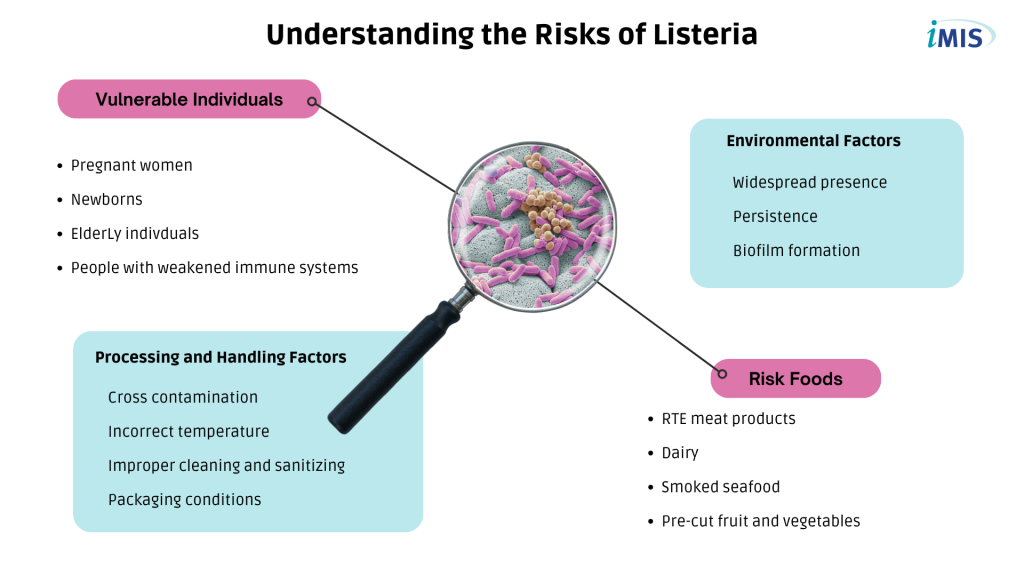Introduction
The European Commission is strengthening its fight against Listeria monocytogenes in ready-to-eat (RTE) foods with a significant amendment to Regulation 2073/2005. This change, prompted by a concerning rise in listeriosis cases across Europe, expands the responsibility for control across the entire food chain, placing greater emphasis on ensuring the safety of RTE products throughout their shelf life.
This article explores the reasons behind this legislative update, its key implications for food businesses, and the steps companies can take to ensure compliance and safeguard public health.
Listeria: A Persistent Threat
Listeria monocytogenes is a foodborne pathogen that can cause serious illness, particularly in vulnerable populations. Its ability to survive and grow even in refrigerated temperatures makes it a persistent challenge for the food industry, especially when it comes to RTE foods that are consumed without further cooking (Figure 1).

Alarming Statistics on Listeria and the Need for Change
The latest zoonosis report from EFSA paints a concerning picture. In 2022, thirty countries reported over 2,770 confirmed listeriosis cases, the highest annual total since EU-level surveillance began. Germany, France, and Spain reported the most cases, but the trend is Europe-wide.
Even more alarming, Listeria monocytogenes was identified as the causative agent in 35 foodborne outbreaks, affecting nearly 300 people and resulting in 28 deaths. This represents a significant increase and highlights the urgent need for strengthened food safety measures.
The EFSA report also revealed that Listeria monocytogenes was more prevalent in certain “ready-to-eat” (RTE) food categories, such as fish, fishery products, and meat products. This data likely played a significant role in prompting the recent legislative changes aimed at enhancing control measures.
Unpacking the Causes of Listeria Outbreaks in Europe
The recent rise in listeriosis cases across Europe is a complex issue with several contributing factors. While pinpointing a single cause is difficult, several key elements are likely at play:
1. Changing Consumer Habits: The rising popularity of ready-to-eat (RTE) foods, while convenient, increases the risk of exposure due to potential mishandling and storage issues.
2. Complex Supply Chains: Globalization has led to intricate supply chains, making it challenging to trace ingredients and contamination sources.
3. Persistent and Adaptable Pathogen: Listeria monocytogenes is a hardy bacteria that thrives in various environments, including refrigerated temperatures, and can form biofilms on equipment, complicating control efforts.
4. Knowledge Gaps and Awareness: Lack of awareness of safe food handling, particularly among vulnerable groups, can contribute to its spread. Education is crucial for prevention.
5. The “My2” Cluster: A Case in Point: This prolonged outbreak linked to contaminated fish products highlights the challenges of tracing it in complex supply chains, suggesting a persistent contamination source higher up in production.
Understanding the Listeria Regulation
The proposed amendment to Regulation 2073/2005, put forward by the European Commission in April 2024, expands the scope of responsibility for control measures. This amendment expands the requirements for food business operators regarding Listeria monocytogenes in RTE foods.
Key Changes:
- Extended Responsibility: The original regulation focused on Listeria control at the manufacturing stage. The amendment extends this responsibility to all stages of the food chain, ensuring a consistent level of protection throughout the product’s shelf life.
- Stricter Criteria: The amendment reinforces the requirement that Listeria monocytogenes must not be present in RTE foods placed on the market unless the producer can demonstrate that levels will remain below the safety limit throughout the product’s shelf life.
Compliance and Staying Updated
To ensure compliance with the new legislation and stay ahead of future changes, food businesses should:
- Invest in Training: Provide comprehensive training to employees on Listeria prevention and control measures.
- Implement Monitoring Systems: Establish robust monitoring and testing programs to detect Listeria monocytogenes throughout the production process.
- Stay Informed: Keep abreast of the latest scientific research, regulatory updates, and industry best practices regarding Listeria control.
- Utilize Technology: Leverage technology, such as real-time data management systems, to enhance traceability and ensure compliance
iMIS Food: Your Partner in Navigating Food Safety Regulations
Keeping up with the ever-evolving landscape of food safety regulations can be a daunting task for food businesses. Fortunately, tools like iMIS Food can help streamline this process and ensure compliance with the latest requirements, including those related to pathogens like Listeria monocytogenes.
Benefits for Your Business
- Reduced Risk: Stay ahead of regulatory changes and minimize the risk of non-compliance and potential penalties.
- Improved Efficiency: Streamline your compliance efforts and free up valuable time and resources.
- Enhanced Food Safety: Implement robust food safety management systems and minimize the risk of foodborne illnesses.
- Increased Confidence: Operate with confidence, knowing that you’re meeting the latest regulatory requirements.
Stay Connected: Join our Newsletter!
Ready to learn more? Subscribe to our newsletter for the latest updates, tips, and exclusive content delivered straight to your inbox!
Sources
[3] The European Union One Health 2022 Zoonoses Report. (2023). EFSA Journal, 21(12). https://doi.org/10.2903/j.efsa.2023.8442 [1] European Food Safety Authority. (2022, 10 oktober). Listeriadashboard. https://www.efsa.europa.eu/en/microstrategy/listeria-dashboard [2] Food Safety Magazine Editorial Team. (2024, 21 november). EU Expands Responsibility for ListeriaCriteria in RTE Foods to Additional Food Business Operators. Food Safety. https://www.food-safety.com/articles/9920-eu-expands-responsibility-for-listeria-criteria-in-rte-foods-to-additional-food-business-operatorsRelated articles to New EU Legislation Tackles Listeria in Ready-to-Eat Foods: What Food Businesses Need to Know
Many customers and visitors to this page 'New EU Legislation Tackles Listeria in Ready-to-Eat Foods: What Food Businesses Need to Know' also viewed the articles and manuals listed below:
